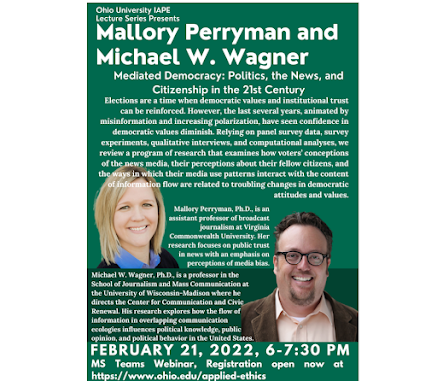The Mediated Democracy seminar held on Feb.21, 2022, was hosted by Ohio University and brought speakers Mallory K. Perryman and Michael W. Wagner. They discussed a wide range of topics that revolved around the media and its perceptions by the general public.
The discussion was centered around the many ways trust is valued with media outlets by audiences in America and whether or not politics have some influence over viewers. When discussing trust, it has dropped significantly over the past few decades. Americans' trust in the media hit its all-time low in 2016, with just 32% of adults polled having a great deal of trust in the media. Since a slight increase in 2018, it has dropped yet again.
In an attempt to understand politics and influence in the media, the speakers broke contentious politics down into four areas. These four areas include Partisan Polarization, People Understand of the News Media, Partisan Individuals' Perceptions of Media Use by Others and The Media Flows We Use, and the People We Talk to About Politics.
Democrats, Republicans, and Independents alike have different ways to consume media and trust those media platforms. Approximately 93% of Republicans consider Fox News as their number one sources of news, while approximately 95% of Democrats consider MSNBC as their number one source of news. Other factors have influenced media consumption, including age and media type.
I think it's pretty shocking how audiences align their political affiliations with sources of news that they consume. Liberals and conservatives prefer types of news that have a majority left or right-leaning framing of their stories. Media organizations on the far left and far right have increased their target audiences in the past few years and marketed explicitly to platforms for each political party. Unfortunately, this leaves independents and audiences with no political party affiliation in the dark because their opinions aren't showcased in American media and politics.
It's essential that, as journalists, we build a lot of the trust that audiences used to have in us and our reporting by offering both sides of issues and being reasonably transparent with our reporting processes. That should be true for all types of journalism, from political to environmental writing. We should let our audiences and consumers decide who they should follow on their own accord.

No comments:
Post a Comment